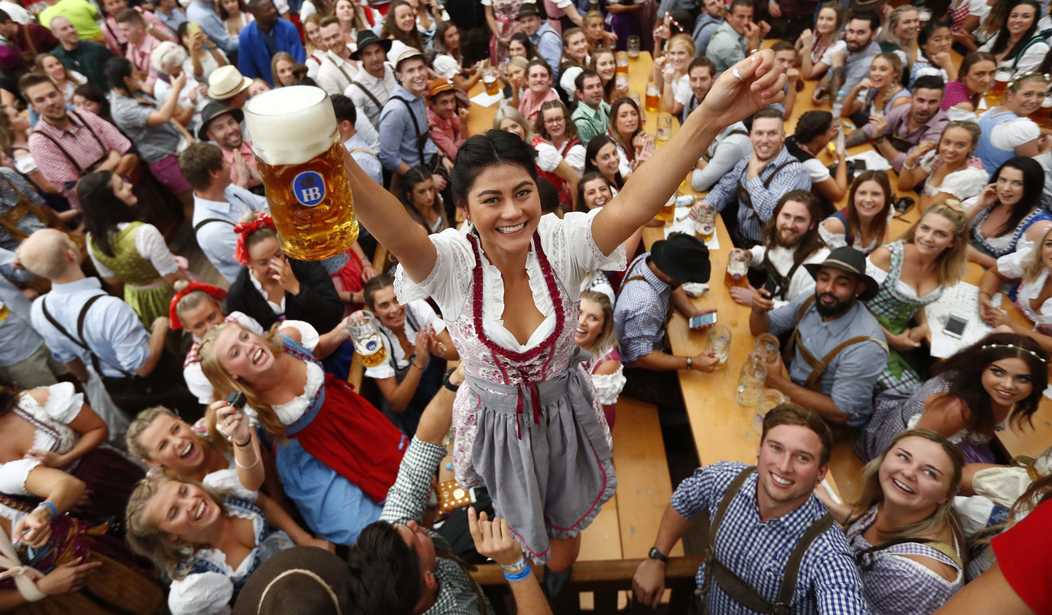Who doesn't love beer? Like lots of folks, I enjoy a good glass of suds from time to time. My local favorite is Alaska Amber, a nice, mildly hoppy brew produced at the Alaskan Brewing Company in Juneau. I'm also fond of Denali Brewing's Mother Ale, and it's handy to pick up as it's produced in Talkeetna, just up the Parks Highway from us.
But now, in a piece of news that should bring alarm to beer drinkers everywhere, we see that brewers of high-end suds are suddenly changing their recipes for sudsy goodness.
Why? You guessed it. Climate change.
On a bright day this fall, tractors crisscrossed Gayle Goschie's farm about an hour outside Portland, Oregon. Goschie is in the beer business — a fourth-generation hops farmer. Fall is the off-season, when the trellises are bare, but recently, her farming team has been adding winter barley, a relatively newer crop in the world of beer, to their rotation, preparing barley seeds by the bucketful.
In the face of human-caused climate change impacting water access and weather patterns in the Willamette Valley — a region known for hops growing — Goschie will need all the new strategies the farm can get to sustain what they produce and provide to local and larger breweries alike.
Hops, of course, is an essential ingredient in good beers (or even in Bud Light). Hops and barley, indeed, are irreplaceable ingredients in that sudsy golden brew we all love so much. But there's good news: Brewers seem confident they can adapt.
That’s why some researchers are working on varieties of hops that can better withstand summer heat, warmer winters, changing pests and diseases and less snowfall, which could mean less available irrigation, said Shaun Townsend, an associate professor and senior researcher at Oregon State University. Townsend is working on a project where he subjects hops to drought stress to eventually create more drought-tolerant varieties.
Well, that's a relief. Where would we be without beer? One can't drink whiskey all the time (a thesis I once set out to disprove as a young man), and what other options are there? Wine? I mean, even bears like to tie one on now and then. At least nobody is (yet) claiming that beer is responsible for climate change, although were, say, the Swedish Doom Pixie to advocate eliminating beer brewing, I can foresee open rebellion in many places.
Still, let's not panic. These things, especially where the specter of climate change is invoked, tend to be less horrible than people generally assume, in no small part because the whole issue is pretty overblown. What's more, beer brewing is hardly a new thing; there exists a 3,900-year-old Sumerian poem honoring Ninkasi, the patron goddess of brewing, which document includes the first written beer recipe. What the ancient Sumerians (who, I hasten to add, lived in a rather warm climate) could do, American and European brewers will no doubt carry on, even if some adjustments in recipes are required.
Beer today? Aside from the mass-produced hosspiss brews like Bud Light, the market of good beers in the U.S. today is an embarrassment of riches. Just to name a few of the products from the two Alaskan brewers I mention above: The Alaskan Brewing Company, in addition to my favored Alaska Amber, also brews a very fine white ale, a very good pilsener and, if you like an IPA, I'm told their Husky IPA is quite good. As far as the Denali Brewing Company, not only do they have the fine Mother Ale, but also a quite nice Hefeweizen, and their Pale Rider American Pale Ale is pretty good. And while I've never been a fan of beers that look like used motor oil, a few years ago, my wife and I spent a long weekend in Dublin, where I developed a keen appreciation for Guinness served as intended in a proper Irish pub.
A visit to your own local beer store will no doubt reveal a host of similarly good local beers. We do indeed live in a golden age (play on words very much intended) of beer, and there's no reason to think this will end any time soon.
Beer, after all, is beloved enough to have sparked a famous annual international competition.














